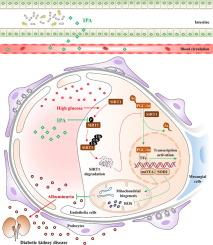当前位置:
X-MOL 学术
›
J. Adv. Res.
›
论文详情
Our official English website, www.x-mol.net, welcomes your
feedback! (Note: you will need to create a separate account there.)
Gut microbiota-derived indole-3-propionic acid alleviates diabetic kidney disease through its mitochondrial protective effect via reducing ubiquitination mediated-degradation of SIRT1
Journal of Advanced Research ( IF 11.4 ) Pub Date : 2024-08-13 , DOI: 10.1016/j.jare.2024.08.018 Yan Zeng 1 , Man Guo 2 , Qi Wu 3 , Xiaozhen Tan 4 , Chunxia Jiang 1 , Fangyuan Teng 4 , Jiao Chen 2 , Fanjie Zhang 5 , Xiumei Ma 6 , Xinyue Li 7 , Junling Gu 8 , Wei Huang 2 , Chunxiang Zhang 9 , Betty Yuen-Kwan Law 10 , Yang Long 4 , Yong Xu 1
中文翻译:

肠道微生物群衍生的吲哚-3-丙酸通过减少泛素化介导的 SIRT1 降解,通过其线粒体保护作用缓解糖尿病肾病
肠道微生物及其代谢物在糖尿病肾病 (DKD) 的发病机制中起着至关重要的作用。然而,哪一种以及特异性肠道衍生代谢物如何影响 DKD 的进展在很大程度上仍然未知。
本研究旨在探讨色氨酸的微生物代谢物吲哚-3-丙酸 (IPA) 在 DKD 中的潜在作用。
进行宏基因组测序以分析 DKD 中的微生物组结构。进行代谢组学筛选和验证以确定与 DKD 相关的特征性代谢物。通过体内和体外实验评估 IPA 对 DKD 肾小球内皮细胞 (GECs) 的保护作用。通过 western blot、免疫沉淀、基因敲除和定点突变进一步验证,阐明了 IPA 对线粒体损伤的机制。
肠道微生物群落结构的改变和色氨酸代谢失调在 DKD 小鼠中很明显。DKD 患者血清 IPA 水平显著降低,与空腹血糖、 HbA1c 、尿白蛋白肌酐比值 (UACR) 和估计肾小球滤过率 (eGFR) 相关。补充 IPA 可改善白蛋白尿,增强肾小球滤过屏障的完整性,并减轻 GEC 中的线粒体损伤。从机制上讲,IPA 阻碍了 SIRT1 磷酸化介导的泛素-蛋白酶体降解,恢复了 SIRT1 在促进 PGC-1α 脱乙酰化和核转位中的作用,从而上调了与线粒体生物合成和抗氧化防御相关的基因。
我们的研究结果强调了微生物代谢物 IPA 减轻 DKD 进展的潜力,为其管理提供了新的见解和潜在的治疗策略。
更新日期:2024-08-13
Journal of Advanced Research ( IF 11.4 ) Pub Date : 2024-08-13 , DOI: 10.1016/j.jare.2024.08.018 Yan Zeng 1 , Man Guo 2 , Qi Wu 3 , Xiaozhen Tan 4 , Chunxia Jiang 1 , Fangyuan Teng 4 , Jiao Chen 2 , Fanjie Zhang 5 , Xiumei Ma 6 , Xinyue Li 7 , Junling Gu 8 , Wei Huang 2 , Chunxiang Zhang 9 , Betty Yuen-Kwan Law 10 , Yang Long 4 , Yong Xu 1
Affiliation

|
Introduction
Gut microbes and their metabolites play crucial roles in the pathogenesis of diabetic kidney disease (DKD). However, which one and how specific gut-derived metabolites affect the progression of DKD remain largely unknown.Objectives
This study aimed to investigate the potential roles of indole-3-propionic acid (IPA), a microbial metabolite of tryptophan, in DKD.Methods
Metagenomic sequencing was performed to analyze the microbiome structure in DKD. Metabolomics screening and validation were conducted to identify characteristic metabolites associated with DKD. The protective effect of IPA on DKD glomerular endothelial cells (GECs) was assessed through in vivo and in vitro experiments. Further validation via western blot, immunoprecipitation, gene knockout, and site-directed mutation elucidated the mechanism of IPA on mitochondrial injury.Results
Alterations in gut microbial community structure and dysregulated tryptophan metabolism were evident in DKD mice. Serum IPA levels were significantly reduced in DKD patients and correlated with fasting blood glucose, HbA1c, urine albumin-to-creatinine ratio (UACR), and estimated glomerular filtration rate (eGFR). IPA supplementation ameliorated albuminuria, bolstered the integrity of the glomerular filtration barrier, and mitigated mitochondrial impairments in GECs. Mechanistically, IPA hindered SIRT1 phosphorylation-mediated ubiquitin–proteasome degradation, restoring SIRT1′s role in promoting PGC-1α deacetylation and nuclear translocation, thereby upregulating genes associated with mitochondrial biosynthesis and antioxidant defense.Conclusion
Our findings underscore the potential of the microbial metabolite IPA to attenuate DKD progression, offering novel insights and potential therapeutic strategies for its management.中文翻译:

肠道微生物群衍生的吲哚-3-丙酸通过减少泛素化介导的 SIRT1 降解,通过其线粒体保护作用缓解糖尿病肾病
介绍
肠道微生物及其代谢物在糖尿病肾病 (DKD) 的发病机制中起着至关重要的作用。然而,哪一种以及特异性肠道衍生代谢物如何影响 DKD 的进展在很大程度上仍然未知。
目标
本研究旨在探讨色氨酸的微生物代谢物吲哚-3-丙酸 (IPA) 在 DKD 中的潜在作用。
方法
进行宏基因组测序以分析 DKD 中的微生物组结构。进行代谢组学筛选和验证以确定与 DKD 相关的特征性代谢物。通过体内和体外实验评估 IPA 对 DKD 肾小球内皮细胞 (GECs) 的保护作用。通过 western blot、免疫沉淀、基因敲除和定点突变进一步验证,阐明了 IPA 对线粒体损伤的机制。
结果
肠道微生物群落结构的改变和色氨酸代谢失调在 DKD 小鼠中很明显。DKD 患者血清 IPA 水平显著降低,与空腹血糖、 HbA1c 、尿白蛋白肌酐比值 (UACR) 和估计肾小球滤过率 (eGFR) 相关。补充 IPA 可改善白蛋白尿,增强肾小球滤过屏障的完整性,并减轻 GEC 中的线粒体损伤。从机制上讲,IPA 阻碍了 SIRT1 磷酸化介导的泛素-蛋白酶体降解,恢复了 SIRT1 在促进 PGC-1α 脱乙酰化和核转位中的作用,从而上调了与线粒体生物合成和抗氧化防御相关的基因。
结论
我们的研究结果强调了微生物代谢物 IPA 减轻 DKD 进展的潜力,为其管理提供了新的见解和潜在的治疗策略。































 京公网安备 11010802027423号
京公网安备 11010802027423号